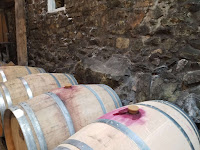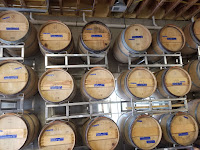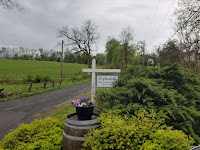With the 2011
Wine Bloggers Conference (July 22-24 in Charlottesville Virginia) only seven weeks away, we decided to post a few articles previewing the conference during the month of June. These articles will focus on a few aspects of the Virginia Wine Industry or the conference itself. The first article discusses a trend we have noticed during the past several years: the influx of foreign born winemakers into Virginia. They could have chose other wine areas, but something attracted them to the Commonwealth. We asked four of this group [Matthieu Finot - France (
King Family Vineyards), Sébastien Marquet - France (
Doukenie Winery), Stephen Barnard - South Africa (
Keswick Vineyards), and the newest incoming winemaker, David Pagan Castaño - Spain (
Breaux Vineyards)] to explain this attraction.
1) What factors lead you to relocate to Virginia?Matthieu Finot: I was coming back from South Africa, and I was planning to stay only 6 month and then to go in New Zealand, it was in 2003 and this vintage kicked my ass! It was the worst vintage that i've ever had and I've been making wines since 1994. I didn't want to give it away. I liked the challenge, I liked charlottesville and decided to give it another try. I never made it to New Zealand! Instead of 6 month I've been here for 8 years now! I've stayed at this wine area the longest for several reasons: (1) it's a young and dynamic wine region, (2) there is lots of room for improvement and experimentation, (3) challenging weather, and (4) Charlottesville.
Sébastien Marquet: After visiting Doukenie Winery in May 2007, I quickly understood that Virginia had big potential to become a world class wine region. The high motivation of the new winery owners, and the professional organization in the state, showed that the winery owners were well organized. The Owners were not seeing this as just a hobby but really wanted to succeed in the industry. I wanted to be part of the development and bring my 22 years of experience to Doukenie Winery. You can't have good wine without motivated people and hard work. My experience in Burgundy, South France; Martinique (Tropical Weather); and the understanding the American palate from working four years in California really gave me the knowledge to create technics required to adapt to Virginia weather conditions, and helped develop a good marketing and sales strategy for Doukenie Winey.
Stephen Barnard: The first reason was that it was so different to what I was used to. Norton, Touriga, Verdejo and Chambourcin were grapes that I never had experience with and I thought that I would learn a lot more by coming to Virginia and exposing myself to new things. The plan was not to stay here, but instead to move to other areas after being here a year or so, but I met my wife and fell in love with both her and the potential for the area. I was always told that Virginia can make decent white wines but not reds, we have proved that theory to be wrong in the last few years here and I see the future as being especially bright. It is a very close knit community with a common interest in wine, and a willingness to share and exchange ideas to ensure the continued growth of the wine industry.
David Pagan Castaño: Love is the main factor. I met my wife Nicole almost five years ago through a connection in a program run by the University of Virginia. She is from Virginia and a true lover of wine. We taught each other about the wine regions of our homes, and I learned about the emerging wine region of Virginia. She works in Business Development, and so to fulfill our needs as a family, we targeted various regions of the world to relocate from the Canary Islands where we were living. Knowing about the evolving quality of Virginia wine, and with DC so close, this area was one of our top choices for its emphasis on business and rich wine growing region. When she was hired by the DC Women's Business Center, I was excited to join the Virginia wine world. You might even call it destiny...
2) How does Virginia compare to other appellations?Matthieu Finot: It is a challenging region because of the weather that is very unpredictable. I had the rainiest harvest (2003) and driest and ripest harvest (2010) in my winemaker's experience. This means that the winemaker has to be versatile and flexible. Every year will be different and we never really know what to expect! (a good way to stay humble.....) In some ways it remind me Burgundy and in general, Virginia is closer to Europe than California or Australia. The style of wine and and the variation between vintage is more old world style than new world. (This may be why one European winemaker likes to work in VA.)
Sébastien Marquet: Since 2007 we've won Gold and Silver medals at the San Francisco International Wine competitions. Our wines are complex, the alcohol is balanced, the flavors and aromas are very attractive. The vineyard management technics are being adapted more and more to the weather conditions. Our biggest challenge is to be consistent in the vineyard year after year. It takes time to increase quality, be consistent, and built a high reputation, Virginia winemaker are working hard to increase quality. Our wines are different from California wines, and different from French wines. The soil is different, the sun is different, and the people are different. We have our own terroir here in Virginia, and we must be proud of that. Promoting our wine for their specificities will make the success of Virginia Wineries.
Stephen Barnard: Virginia has it’s fair share of challenges. We have the threat of late season frost, a season that could be wet or hot; and humid with late season rains, so ripening fruit can sometimes be an issue. We also do not have a long history of growing grapes and making wine so we are not quite sure what to plant and what to focus on. Our demographic is starting to get into wines and there is this wonderful curiosity of wine which is a whole new market waiting to be tapped which is exciting. We are not restricted by a certain style so we have room to experiment and play around, which for me, is very exciting.
David Pagan Castaño: Virginia is in the process of establishing itself as an important wine growing region in the U.S. I am excited to be a part of this rapid development, and I hope to bring a new perspective to the table that will put us on the global wine map. In this dynamic moment for Virginia, it is difficult to compare it to other wine growing regions of the world. It definitely has the potential to produce consistently high quality wines, and it will require a lot of collaboration to identify and take advantage of the characteristics of the region's terroir.
3) Where do you see the Virginia wine industry in the next 5-10 years?Matthieu Finot: I've already seen so many changes in 8 years that I hope it won't stop here! Quality is up and will keep rising. We know more about which grapes grow well and how to manage the vineyard to so that premium grapes are brought into the winery. Time, knowledge, experimentation, and detailed focus will keep pushing up opportunities to craft high end wines. I think Virginia produces more and more world class wines; we need now to convince the world about it!
Sébastien Marquet: Coming from Burgundy (where wineries have existed more than 200 years) 10 years is a very short period of time. I am sure that the numbers of wineries will double and that the quality will be more consistent. We are lucky to have people who are supporting the wine industry and I am particularly thinking of Professor Bruce Zoeckklein, Professor Tony Wolf, and Governor Bob McDonnell and his wife (First Lady Maureen McDonnell).
Stephen Barnard: The future is no doubt bright. I see more consumers focusing on Virginia wines, once they get over the perception that we cannot make good quality wine at an affordable price point. We have a responsibility to ensure we keep raising the bar and promoting our product, not only our wines at Keswick, but the rest of the Virginia wines. I see the wineries streamlining their products and focusing on specific varietals and wine programs, not trying to make 30 different wines; hopefully we will have clearer understanding of what will give us the best chance to be competitive year in and year out. I think you will see Virginia wines and the area being spoken about as a quality wine producing state. You have got some young winemakers, who are extensively trained and knowledgeable, crafting some exciting wines that will wow the consumer.
David Pagan Castaño: If Virginia continues to work on its cooperative efforts, it will not only be a fantastic destination for wine drinkers, but its wines will also be in high demand in regions all over. The recent decision by the Virginia Wine Board to promote Virginia Viognier is an example of this type of cooperation. By concentrating efforts to improve and promote this varietal, the whole region can "get behind" a common goal that could eventually lead to a true appellation or regional standard that raises the quality of all wines. As in rugby, teamwork is essential to the success of any team. If we work as a team, Virginia will be a major player in the wine world.
 In late-April, we purchased tickets to the Loudoun Wineries Association's Spring 2023 Barrel Tasting visiting five out of a possible 14 wineries in that county that participated. Our group started at Willowcroft Vineyards, the oldest winery in the county and the 8th oldest in the Commonwealth of Virginia. Owner and winemaker Lew Parker purchased the property in 1979, planted grapes the following year, constructed the winery in 1983, and opened it to the public in '84. Today they grow 12 grape varieties with Albarino and Riesling being long-time favorites of ours.
In late-April, we purchased tickets to the Loudoun Wineries Association's Spring 2023 Barrel Tasting visiting five out of a possible 14 wineries in that county that participated. Our group started at Willowcroft Vineyards, the oldest winery in the county and the 8th oldest in the Commonwealth of Virginia. Owner and winemaker Lew Parker purchased the property in 1979, planted grapes the following year, constructed the winery in 1983, and opened it to the public in '84. Today they grow 12 grape varieties with Albarino and Riesling being long-time favorites of ours. 
 After lunch at Monk's BBQ in Purcellville, we headed a few miles north to one of our go-to wineries: Walsh Family Wine. We've spent time with Nate over the years, at the old Whole Foods tastings, through his seminars at Sunset Hills, and now operating Walsh Family Wine with his wife Sarah. The barrel tasting started on a high note with the first white wine of the day, a delicious Chenin Blanc. Just a touch of oak and substantial fruit. We also tasted, I believe, a Merlot and a Tannat, in between conversations on racking, blending, and viticulture in general. We finished with the very drinkable and ready Paeonian red blend - named after the town of Paeonian Springs where the grapes for this wine were sourced. This will be a highly prized release.
After lunch at Monk's BBQ in Purcellville, we headed a few miles north to one of our go-to wineries: Walsh Family Wine. We've spent time with Nate over the years, at the old Whole Foods tastings, through his seminars at Sunset Hills, and now operating Walsh Family Wine with his wife Sarah. The barrel tasting started on a high note with the first white wine of the day, a delicious Chenin Blanc. Just a touch of oak and substantial fruit. We also tasted, I believe, a Merlot and a Tannat, in between conversations on racking, blending, and viticulture in general. We finished with the very drinkable and ready Paeonian red blend - named after the town of Paeonian Springs where the grapes for this wine were sourced. This will be a highly prized release.  Our last stop of the tour was very close to where we started, Zephaniah Farm Vineyard -- located just south of Leesburg. The property has been a family farm since 1950, first as a dairy farm and then as a vineyard since the early 2000s when the first grapes were planted. Winemaker Bill Hatch has been known for his Cabernet Franc and that was the focus of this day's barrel tasting. Specifically, they poured a 2021 Cabernet Franc that was resting in a 500-liter neutral Hungarian oak puncheon and the same vintage aging in a 228-liter French oak barrel. Obviously, the version aging in the puncheon showed more fruit whereas the smaller French oak was providing more spices and tannic character. The winery plans to combine the wine from both barrels into a third barrel, but I wish they would bottle some from just the puncheon - slightly chilled it would be a delicious summer sipper.
Our last stop of the tour was very close to where we started, Zephaniah Farm Vineyard -- located just south of Leesburg. The property has been a family farm since 1950, first as a dairy farm and then as a vineyard since the early 2000s when the first grapes were planted. Winemaker Bill Hatch has been known for his Cabernet Franc and that was the focus of this day's barrel tasting. Specifically, they poured a 2021 Cabernet Franc that was resting in a 500-liter neutral Hungarian oak puncheon and the same vintage aging in a 228-liter French oak barrel. Obviously, the version aging in the puncheon showed more fruit whereas the smaller French oak was providing more spices and tannic character. The winery plans to combine the wine from both barrels into a third barrel, but I wish they would bottle some from just the puncheon - slightly chilled it would be a delicious summer sipper. 









